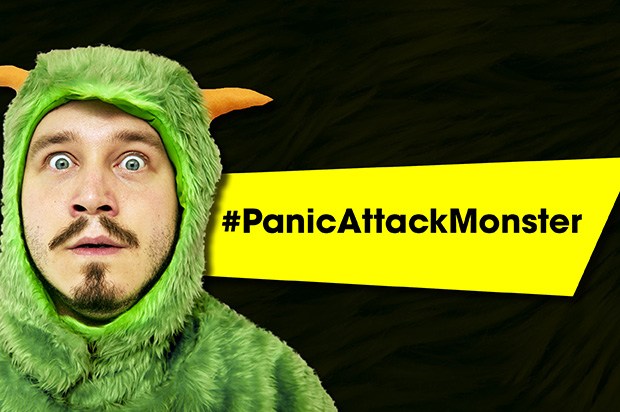Expert chat: Panic attacks and everyday life
 Psychotherapist Dr Aaron Balick answers your questions about the practicalities of living with panic attacks, including coping strategies and seeking help.
Psychotherapist Dr Aaron Balick answers your questions about the practicalities of living with panic attacks, including coping strategies and seeking help.
Steph: Can I have some advice for panic attacks during exams? It has happened to me in the past and I'm worried about it happening again.
Dr. Aaron: If you feel yourself getting nervous during an exam, take a deep breath in through your nose, and when you breathe out, imagine all the stress and anxiety going out of your mouth. Look around the room and say to yourself, "Here I am in a room, just taking an exam, nothing terrible is going to happen." We all get nervous for exams, that's normal. The problem is now because you've panicked once before, when you feel that normal nervousness, you think,"Oh god, I'm going to panic!" DON'T BELIEVE IT! You can calm yourself down, and it's a great skill to have once you've got it down.
Phoebe: How do you stop yourself from having a panic attack, particularly when you're in a tight space with no room at all to move?
Dr. Aaron: A phobia, such as claustrophobia, is a little different from a panic attack. It's best to face phobias with a bit of help from a cognitive behavioural therapist (CBT). You can take little challenges so you face your fear of small places in a way that feels manageable to you. Like first just trying to imagine it, or looking at photos of a place that scares you. When you learn to manage that, you take the next step, and before you know it, you find you can face the bigger fears no problem!
Pippa: Aaron has helped us write an article about CBT. Check it out if you want a bit more info.
Olivia: I got told that when you have a panic attack, you have to recognise that you are having one, work out why you are having it, then try and calm down. What if you don't know why you are panicking?
Dr. Aaron: You don't necessarily have to know why you are panicking in order to calm down. You can take a deep breath, and try to sit beside the panic rather than feeling it inside you. Just like the panic monster! Instead of having him be in you (probably in your chest, sitting right on your heart!), he can be sitting next to you. Some people find it helpful to imagine their panic visually, and then shrink it down.
Sally: Making it black-and-white instead of in colour helps too
Pippa: For those of you haven't seen our panic monster video that Aaron mentions, it might be worth a watch.
Dr. Aaron: Yes, making it black-and-white helps people too. Others like to think of their panic as a loud noise, and they imagine a dial so they can turn the noise down. The trick is to turn the scary thing into something that's not so scary. You know, like a purple fuzzy thing the size of a mouse. A harmless thing. You could laugh at it. Can you guys think of something absolutely ridiculous that you could turn it into? A tiny stuffed llama? A furry fish wearing wellies?
Pippa: Or as in our video a green fuzzy monster that can beat box!
Sally: Aaron - you're quoted on The Mix's website as saying it's possible to control panic attacks completely eventually. What's the average time for somebody who is regularly accessing some type of talking therapy?
Dr. Aaron: Some people can expect a pretty quick turnaround with more straightforward anxieties, say, like public speaking or exam panic, though some will struggle to get rid of it more than others. For those who have an anxiety disorder of some sort, it can take more time. Everyone's different, and some will respond to therapy more quickly or more slowly than others. Most people find that once they've made a start, things start to improve.
Faye: I have PTSD and some days I'm so much more sensitive than others. The littlest of things can trigger panic attacks, or sometimes a place just doesn't feel safe to me and I panic. I'm not so sure on how to manage this.
Dr. Aaron: PTSD stands for "Post Traumatic Stress Disorder" and can happen to people who have experienced some difficult stuff. The good news is that PTSD is a treatable condition. You may find that through "working through" your past with a therapist, you can better live in the present. Of course you can't take your past away, but you can learn to live a life where it doesn't haunt you quite so much.
Cara: I get panic or anxiety attacks in class at college and it's horrible. How can I sort myself out when I'm in a public area?
Dr. Aaron: When we panic, we sometimes think the whole world can see, when in fact the storm is going on in our heads. Most colleges will have a student support team so I would suggest you go there and tell them what's going on. In the meantime, a handy thing to realise is that whenever you've had those experiences, nothing has happened to you. So if it comes up again you think, "Okay, here I am having this feeling. But I'm just sitting here in class, nothing terrible is happening to me, so I'm going to take that nice deep breath, and then do it again, and calm myself down."
Veronica: I think it's really embarrassing when I have a panic attack, People sometimes laugh depending on the situation. I say 'It's not funny, I literally feel like I'm going to die,' which makes them laugh more. How are you supposed to explain it without getting personal?
Dr. Aaron: It might be that these folks don't really know how bad it is for you - or it could be that they get uncomfortable and don't know what to do, so they giggle. I suggest you take them aside and tell them straight. First say something like, "There's something important I want to talk to you about" so they know it's serious, and then tell them what it's like for you. Tell them that it feels very serious and you feel hurt and upset when they laugh. Then you might tell them what would be a more helpful response. Just make sure you get the timing right (when they're not rushed or anything) and be sincere with them.
Next Steps
- Chat about this subject on our Discussion Boards.
Updated on 29-Sep-2015
No featured article










